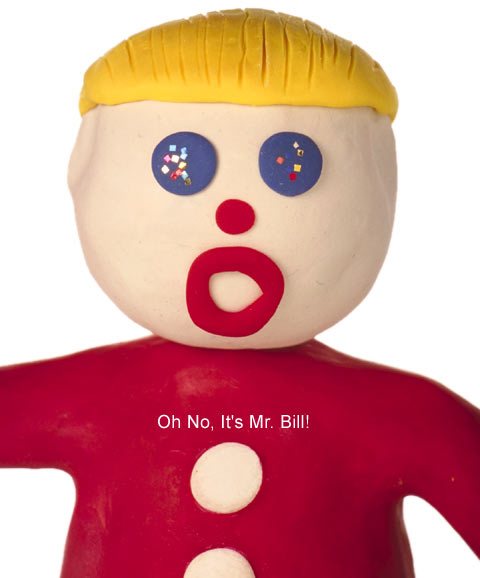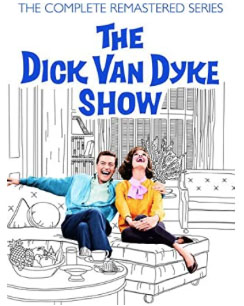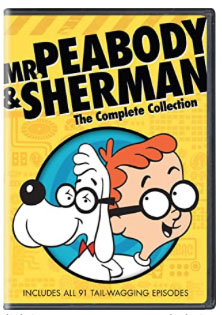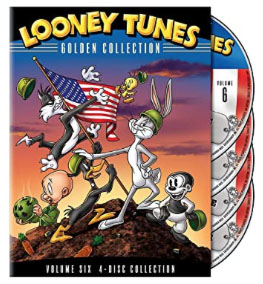






 |
 |
 |
 |
 |
 |
 |
|
| |
|||||||
|
by L. WAYNE HICKS Saturday Night Live evolved from a cult hit to a mainstream success, and along the way made a star of a simple Play-Doh figure known as Mr. Bill. In the early seasons of Saturday Night Live, the long-suffering figure was stepped on, dropped from the Empire State Building and slammed into a brick wall at the hands of the evil Sluggo and the treacherous Mr. Hands - all in the name of entertainment. Entertaining it was. The Super 8 films featuring Mr. Bill were audience favorites, a respite from the hit-or-miss skits that featured the original Not Ready for Prime Time Players. A survey once rated Mr. Bill third in popularity, following John Belushi and Gilda Radner. Mr. Bill's high-pitched exclamation of dismay - "Ohh, nooo!" became a national catchphrase that fans even used to greet Saturday Night Live performers on the street.
That's history now. Mr. Bill left the show in 1980, when series creator Lorne Michaels and the original cast departed (Michaels has since returned). Mr. Bill's creator - and voice - Walter Williams kept his Play-Doh pal in show business after Saturday Night Live, with commercial pitches for Holiday Inn and Lexus and new episodes of the Mr. Bill Show. Mr. Bill appeared on Rich Little's 1981 album "The First Family Rides Again," which had President Reagan joining forces with Sluggo. Today Mr. Bill can be found at mrbill.com, where Williams sells collections of Mr. Bill videos and DVDs, boxer shorts, Halloween costumes and other memorabilia. The site also features Williams' other work, including the pilot for Michael O'Donoghue's Fox television series, simply called "TV," and a commercial parody for Saturday Night Live about Elvis' coat going on tour. In a telephone interview from his home in California, Williams reflected on the origins of Mr. Bill.
Williams: Yeah, which was actually the first season. It was the '75-'76 season, which was the first. It was on in February of that first season in '76. LWH: How does a guy from New Orleans manage to get something on Saturday Night Live? Williams: I'm Lorne Michaels' cousin. LWH: Really? Williams: No. I'm just kidding. Actually, I was making little films in New Orleans. I kind of decided that's what I wanted to do. I was making comedy shorts and showing them around town. Saturday Night Live came on the first season and somebody mentioned to me they had this contest where you could send in your home movies. I sent a reel of films in, one of which was my first Mr. Bill film. That's the one they picked and put it on the air. In fact, when they aired it, it was Feb. 20-something, I forget the original airing, and it happened to coincidentally be the same weekend as Mardi Gras. Saturday Night Live was pre-empted that night, even though they told me they were going to put it on. The affiliate let me come and watch it, but no one believed me that it was on. But it was. LWH: Did you think that was going to be a one-shot deal? Williams: Yeah. Pretty much. Most of the films, I come up with an idea and I make the film. I don't really plan to be doing it over and over again for 25 years and selling boxer shorts and things or whatever. But there was a demand for it and they asked me to do more. I just kept making more and more and finally got on staff and made a whole lot more, along with other films. It's a great opportunity. I got to make a lot of movies and get a lot of audience reaction. LWH: So you were on staff for a while? Williams: Yeah. I was officially on staff for the fourth and fifth seasons. I got hired as a staff writer also. I did other films and skits. The first film I did, non-Mr. Bill, was this concert of Elvis Presley's coat. It was just the coat on tour. That went over pretty well. I wrote skits, Weekend Update jokes, and also did Mr. Bill films. I really had two jobs, going around the clock there the last couple of years. LWH: Was it your goal to get on staff, or was that just a lucky happenstance? Williams: No. Well, when they started doing the Mr. Bill movies I told Lorne Michaels I wrote other material. He said, "Well, why don't you submit something for the commercial parodies?" I wrote a couple of things and he liked it and gave me a writing position the fourth year, the fourth season. The first three seasons I just kept making the Mr. Bills and submitting them. I didn't get paid anything but I knew I was building an audience so I figured I would just keep doing it, as long as they would put them on. Finally they got so popular they gave me a full-time job doing that. LWH: How did you come up with the characters?
Then I decided I want to set it as kind of a kids show type motif. I came up with the Mr. title. Mr. Something because everything is Mr. when you do a kids show. I knew that I didn't want to start beating up Mr. Bill right away. He doesn't enjoy it. People mistake it as some kind of masochistic thing. He's always complaining, but he just can't get away. He's kind of a victim of his form of animation. He can't run away. He's just there for whatever's going to happen to him. I decided I needed to delay the action a little bit. I gave him a best friend, his dog Spot, to start working on first. And then Sluggo is just like the figurehead character. He never talks or anything, but he's always the doctor or the insurance agent, somebody that's a figure of authority. Mr. Hands was really kind of carrying out orders. He wasn't really doing anything malicious. He was basically just trying to help. So there's this formula to it that seems to work. Seemed to work. LWH: Were you the voice of Mr. Bill? Williams: Yep. LWH: How long did it take you to think of that voice? Williams: Right off the bat. It came right out. I knew I wanted to do a high voice, a silly kind of kiddie thing and that's just what came out. The early season also had the Muppets on there, which didn't really catch on. Williams: Actually, it wasn't the Muppets. It was new characters created by Jim Henson. I don't think they were even called Muppets. LWH: They were just & Muppet-like creatures. Williams: Right. Exactly. LWH: But they never caught on like Mr. Bill did. Williams: I guess not. Well, they were the first season and Mr. Bill went on a few more, so ... LWH: Why do you think Mr. Bill caught on? Williams: I tried my best to make it funny. I guess other people thought it was funny too. I basically got to make the film. I didn't have to go around and pitch it. In fact, if I had gone around and pitched the idea to try and raise funding, they would have had security wrestle me down or something. But it fit into my budget at the time, which was Super-8 films. The film, the processing, the Play-Doh, a few props, and my time. I just kind of kept evolving the character once I got an opportunity to do more. I really didn't think of it as an ongoing thing. The challenge was to continue to surprise the audience. That's what it takes to make people laugh. A lot of committees and big studios put a lot of effort into assuring that people are going to laugh, but it doesn't really work that way. Somebody, a real tight-knit group of people, has to think it's funny in the first place and somehow preserve it all the way through the production phase and editing. If you can kind of preserve that all the way through without giving it up and thinking it's old, the audience sees it for the first time and hopefully laughs. I think I have a talent for it and luckily I got the opportunity to make the films. I didn't make it for a late-night Saturday night audience. Everything I make are things that seem funny to me. LWH: How long between the first and second appearances of Mr. Bill? Williams: Let's see, the first one was on the first season and the second one was, I think it might have been at the end of the first season. There might have been two on the first season. The second one I actually appeared in. Mr. Bill goes to a party, a real party. Most of the movie he's getting ready to go. Different stuff happens to him. He goes to the party. It's a real party with people and the doorbell rings. I say, "Oh, I'll go see who it is." Mr. Bill is standing there below the door. You see me come out, I don't see anybody, I go back in. There's no one there. Then I cross my leg. My foot comes into camera and Mr. Bill's flattened on the bottom of my shoe. That was me. LWH: Your claim to fame. Williams: Right. LWH: Did you keep using Super-8 the entire time you were making the movies? Williams: No. The first four seasons I did. Even the first full-time season I had I continued, then I moved into 16 mm. I've actually done several Mr. Bills over the years for different shows. In fact a few years ago, the first season on the Fox Family Channel, I did 40 new episodes and I used digital video. Sometimes I use a computer-generated replacement for certain stunts that would be hard to achieve with the real thing. He's been kind of a big science project for me. I've gotten to try out a lot of different techniques and technologies, computer animation. LWH: Mr. Bill always met an untimely end. Williams: Somehow, yeah. LWH: Did you go through lots of Play-Doh? Williams: Oh, yeah. By the peak of Saturday Night Live, I was going through the 55-gallon drums of Play-Doh. They don't last too long. It takes, actually, several stunt men per episode. READ
PART TWO of the Walter Williams interview |
L. Wayne Hicks is a Denver-based writer and student of popular culture. He is completing his first book, the story of the TV show Romper Room.
Visit
mrbill.com
|

|

|

|

|
 |
 |
 |
 |